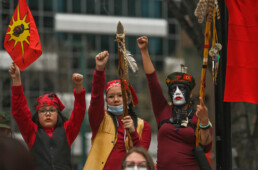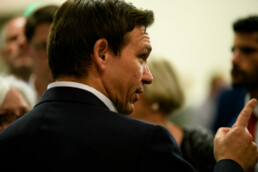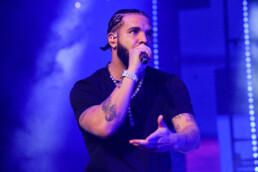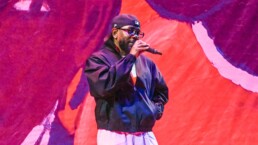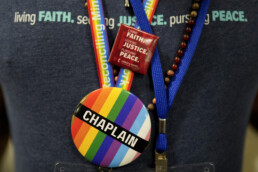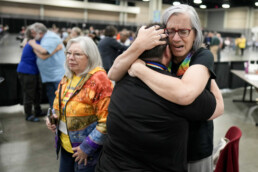Connie Walker on Telling Indigenous Stories
|
Greetings, Meteor readers, My sincere condolences to all the New Yorkers reading this who suffered through another disappointing end to the Knicks’ playoff run this weekend. But look on the bright side: Now you have so much free time to cheer on the Liberty. It’s what Jalen Brunson would want you to do. In today’s newsletter, a word on the importance of Indigenous journalists from Connie Walker. Plus, the AI overlords strike again. Better luck next year, Shannon Melero  WHAT'S GOING ON
 CLARK AT A RECENT APPEARANCE AGAINST THE LIBERTY. (VIA GETTY IMAGES)
 LESS THAT ONE PERCENTWhat Happens When Indigenous Women Tell Their Own Stories?The crisis of violence would look completely different, says Pulitzer-winning Cree journalist Connie Walker.BY SHANNON MELERO Demonstrators march for Red Dress Day in Edmonton, Canada to commemorate the lives of missing and murdered Indigenous women. (VIA GETTY IMAGES) In 1995, a Saulteaux woman in Regina, Saskatchewan, was brutally beaten to death by two young white men who had spent the night drinking and were looking for an “Indian prostitute.” Those were the exact words used by the killers—and then repeated by the media and the presiding judge in the case of Pamela George, a mother of two and a member of the Sakimay First Nation. Words matter: According to the Canadian Broadcasting Corporation (CBC), the justice “reminded the jury George ‘indeed was a prostitute’ when they considered if she had consented to sex.” That assertion that she must have done so (even though one of her killers was hiding in the trunk when she was picked up by the other) “was the key to the two being found guilty on the lesser charge” of manslaughter. The men were sentenced to six and a half years, but one of them, Steven Kummerfield, whom news outlets described as a “university basketball star,” was released on parole after only four years. As this story unfolded and as Native women’s groups grew more outraged by the case, a young Cree teenager, Connie Walker, was witnessing it all. She was so moved by Pamela George’s mistreatment in news media that she wrote about the case for her high school newsletter—and began what became a barrier-breaking journalism career, eventually winning a Pulitzer, a Peabody, and hosting the podcast Stolen about unsolved cases of murdered or missing Indigenous people in North America. Last year, at the global summit Free Future 2023, Walker reflected on the impact that coverage of the original case had on her. “They didn’t talk about the fact that she was a single mother,” she noted. She found herself wondering, “Are there any Indigenous people in these newsrooms?”  WALKER DURING HER PANEL AT FREE FUTURE (COURTESY OF FORD FOUNDATION) Statistically, there aren’t: The Columbia Journalism Review reported as recently as 2019 that less than one percent of journalists working at major newspapers or online publications are Native American. The report also found that most newsrooms don’t have a designated beat to cover “Indian Country,” the still commonly used legal term that encompasses all of the reservations in the United States and non-reservation communities with high concentrations of Indigenous people. A report released the following year by the Native American Journalists Association tracked how frequently Native news was covered in a single year across five major outlets (Washington Post, NPR, The New York Times, The Guardian, Fox News) and found that of the 87 articles that mentioned Native communities, a majority were written by non-Native reporters. How many Native reporters were found to have worked on one of those 87 articles? Six. That absence of representation has unique implications for reporting on sexual violence. In the United States, 56% of Indigenous women have experienced sexual violence, according to Amnesty International. In the U.S. alone, there are more than 5,000 reported and unsolved cases of missing or murdered Indigenous women, girls, two-spirit and trans people (MMIWG2T). As Dr. Sarah Deer said in 2017. “While there are over 560 federally recognized tribes in this country, each with a unique history, culture, and language, the constant for all native people is the inevitability of rape.” Who tells these stories matters. While we have long been told that reporting is about being “objective,” Walker points out that that has never really been true. “One of the things that I'm grateful is happening right now [is]...a recognition of how subjective journalism is, and has always been,” she has said. “And I think that for so long—in Canada, the United States, everywhere—that those stories have been told by people who aren't representative of the societies that they're reporting on.” Her work changes that—as does the work of journalists like Brandi Morin and Chelsea Curtis and initiatives like the IWMF’s Fund for Indigenous Journalists or the National Indigenous Women’s Resource Center. “There’s a power in being able to tell a story,” says Walker. “There’s a responsibility in that.”  FOLLOW THE METEOR Thank you for reading The Meteor! Got this from a friend? Subscribe using their unique share code or snag your own copy, sent Tuesdays, Thursdays, and some Saturdays.
|
![]()
The Threat of Ozempic "Coercion"
The drugs are everywhere. Oprah takes them; I’ve taken them. But activist Virgie Tovar says that in a fatphobic culture, there’s no such thing as a truly free choice.
By Samhita Mukhopadhyay
Over the last few years, weight-loss drugs—a category that includes semaglutides like Ozempic and Wegovy and the tirzepatide Mounjaro—have surged in popularity; so have conversations about them. Oprah, who is taking a semaglutide, just hosted a special on her evolving feelings about weight loss; body-positive influencers who have decided to go on these drugs are being asked why. I have written about my own experiences both taking and later coming off Mounjaro, including my concerns about what taking a “diet drug” might mean for my longtime commitment to size inclusivity.
I wasn't sure there were many more new thoughts around this issue. But a recent conversation with Virgie Tovar, the longtime fat activist and the author of You Have the Right to Remain Fat, made me think differently. Tovar has been vocal about her feelings about Ozempic and what it means for the lived reality of fat people. I asked her to talk to me about it all.
Samhita Mukhopadhyay: I’ve been dying to have this conversation with you, Virgie. You’ve written about fat politics and done groundbreaking work in the fat inclusion space for decades. What are your thoughts on Ozempic?
Virgie Tovar: The question for me is: What does going on Ozempic look like in a culture where there's so much fatphobia? I've always wanted women to be able to choose whatever is going to help them thrive within the culture we live in. For me, it's been fat activism; it's been being anti-diet, it's been being fat. These are the things that have helped me thrive. I've never been happier, I've never been more connected, and I've never felt more successful. I want a world in which people can choose to do whatever is going to help them [while] understanding that there is no truly full autonomy to choose. I think about the arguments that feminists were having in the eighties around what consent even means in a culture [of] misogyny. That question haunts our culture in all these different ways.
How do you address the question that everyone brings up when anyone talks about fat acceptance: “What about your health?” Oprah just did another special on weight loss—this time, taking on diet culture. And it wasn’t terrible! But she still said that “obesity is a disease.” What do you think about that?
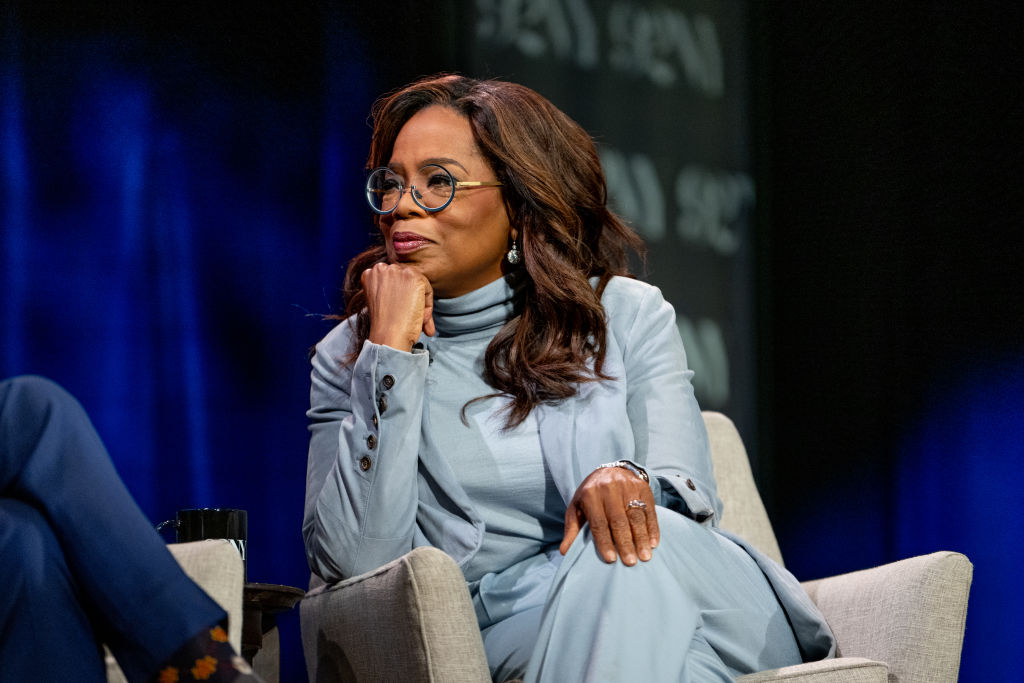
One of the things that's really important to understand is that the American Medical Association’s decision to classify obesity as a disease [in 2013] was a political decision. It wasn't a data-driven decision. There was a committee that was assigned to do a literature review and to make a call based on the review—and their call was [obesity] does not qualify as a disease. [The AMA moved forward with the decision despite the committee’s recommendation.] This is one of those itty-bitty moments in medical history that gets completely buried. The only headline was obesity disease, obesity disease.
The AMA decision, inadvertently or not, created a pathway for physicians to step in and become the face and the leadership of diet culture. And now we're looking at prescriptions. Now we're looking at medication; now we're looking at pathology. We're not [just] talking about beauty and whether or not you can wear a bikini in summer; we're talking about diabetes. Which is [a significant] shift because an unregulated non-physician-run diet industry doesn't get the [same] traction that a lab-coat-wearing person talking about illness [does].
What I find so fascinating about this whole conversation is that fatphobia and weight-loss preoccupation are so central they create a reality in which all outcomes end [with weight loss]. And there's another universe in which when people have a health concern, instead they think, Why don't we have universal healthcare? There's a world in which we look outward, and we demand—with the same fervor that we're searching for Ozempic—that we change the policy and that every single person has universal healthcare. There’s a world in which when people start to have [health issues], they think, why are we working so hard? But that’s not what we do.
What amazes me is there are a million potential health interventions available to human beings, but no one sees any of those. [Weight loss] is the only solution we're comfortable with.
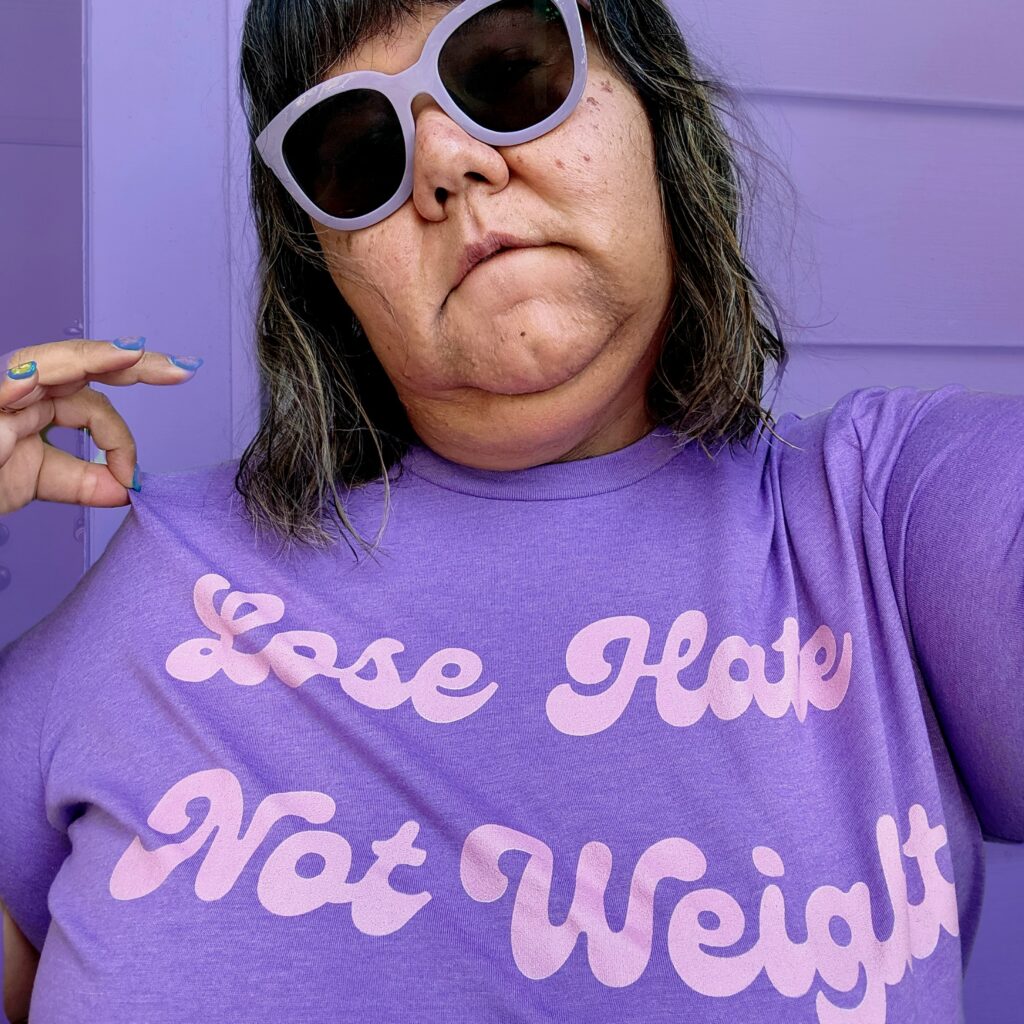
And what is your response to people who reiterate the research about obesity and life expectancy?
The culture is obsessed with one piece of data, which is that fat people live shorter and less healthy lives than thin people. And what's scary to me is that one piece of data gives pharmaceutical companies and doctors this cavalier attitude. It creates an extremely terrifying, morally hazardous reality in which whatever happens to us [as we try to lose weight] is just collateral damage; it's all learnings on the way to the solution [of weight loss] that they truly believe is just around the corner. When weight science is very clear that it's not. Unless we're talking about literally genetically altering zygotes, unless we're talking about eugenics, there isn't a reality in which there aren't going to be bigger people and smaller people.
There is no single data point that tells an entire story. When you look at the multiple data points [around weight and health], they tell you a [more] clear story. So, the first additional data point I want to bring up is that all marginalized groups live shorter or worse lives than people who are in a dominant group. Black Americans still live shorter lives than white Americans, and people in the LGBTQ community have worse health outcomes than people in the straight community. So, right now, weight discrimination is legal federally. When we accept what minority stress theory teaches us—which is that all marginalized groups have worse health outcomes—that starts to fill out the story.
We have this idea that without diet culture, Americans would just eat nonstop and become bigger and bigger—but that’s a lack of understanding of basic data: Dieting makes us binge-eat and increases our weight over time.
[With other issues], we don't use the framework of “We have to change that person” in order to fix it. We understand that there are societal problems that need to be solved in order for people to have a better quality of life and longer life expectancy. It is only our fat phobia that disallows us from using the frame that we use to understand every other civil rights issue.
Then the second data point is that even though our culture thinks that weight loss is awesome and healthy, weight science is very, very, very clear—the body and the nervous system may experience weight loss as extremely distressing. The third data point is that we know that people who are in larger bodies who don't have high internalized fatphobia have [better] health outcomes [than] people in the same larger bodies who do. They don't have the same [reduced] longevity outcomes as people who do internalize fat phobia.
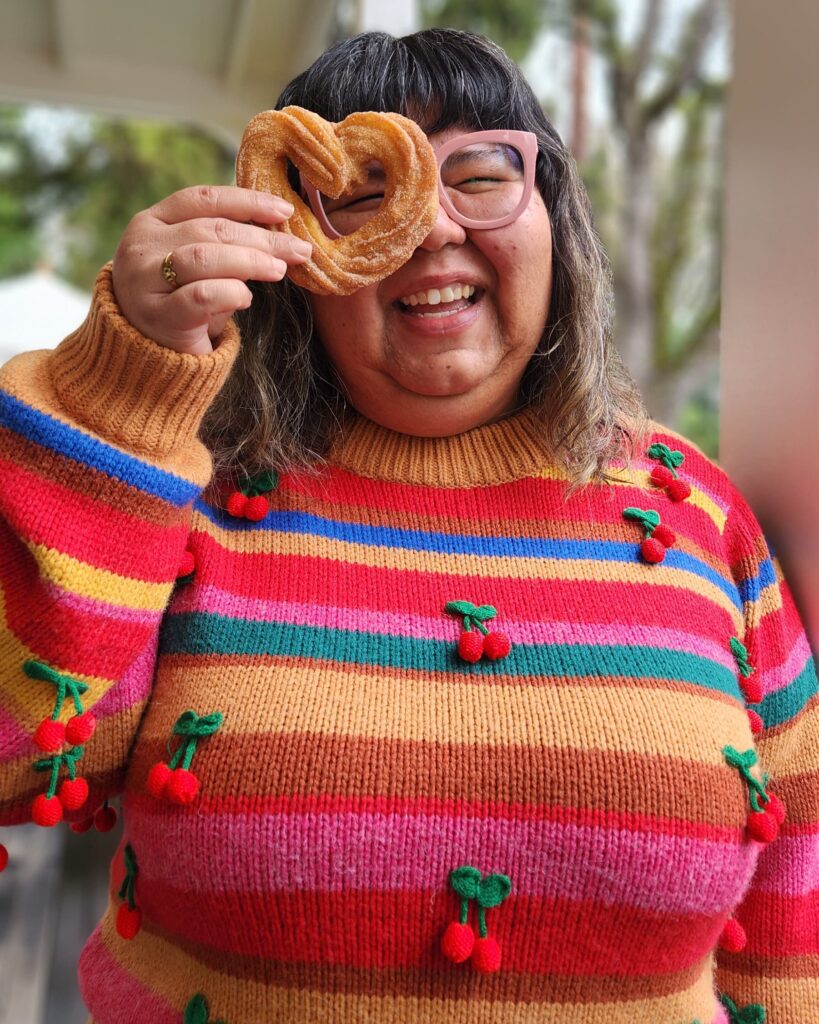
So, what do weight-loss drugs mean in the context of all this?
We try to create environments of neutrality where people can make the right decision around serious medications but that is not the environment we are in [around weight loss]. I've been using the word coercive to describe it.
Can you expand on what you mean by “coercive”?
Number one: we live in a culture that hates fat people. I think that's changing, but people really still believe that the worst thing you could be is fat. So imagine making a decision about whether or not you're going to take a medication that has pretty intense side effects, and that is very costly in the context of If you take this, you will [no longer] be part of a group of people who are reviled or discriminated against.
I can imagine it.
Now that we're understanding it's wrong to promote weight stigma, the thing that feels like it's in the air—that continues to be the dog whistle—is like, But health! You can convince yourself that nobody should be pressured to look a certain way. And that's easy to get behind because we all kind of know that's wrong. But what they're doing is this brilliant rhetorical pivot. How could you argue health?
When the path to that “health” (i.e., diet culture) is not always very…healthy.
Yeah. The other part of the story that people have a hard time understanding is a lot of the health outcomes that higher-weight people have are also correlated with chronic dieting and chronic food restriction. We have this phenomenon where [after dieting] your body is now armed and ready for when you do this again. And the way that it's doing that is by increasing your baseline weight. We have this idea that without diet culture, Americans would just eat nonstop and become bigger and bigger—but that's a lack of understanding of basic data: Dieting makes us binge-eat and increases our weight over time.
There’s also been a pretty robust conversation about body-positive influencers taking these drugs. It was reported in The Washington Post that one of these drug companies had reached out to you to see if you’d be interested in going on a GLP-1. Why do you think they are going after influencers?
Plus-size women [authoring] their own stories changed the culture; people didn't know that they could opt out of dieting until body positivity came around. And now that the genie’s out of the bottle, it would take an incredible reversal—which I think, frankly, some of these pharmaceutical companies are trying to do. They see it, right? Why in the world are you targeting body-positive influencers if we're not a threat?
So, after reading everything I've written about my own journey about going on and off Mounjaro, and especially making the decision to take the drug after my father died from diabetes-related complications—what advice would you have given me throughout this?
The very first thing I would've told you is grieve. Don't let the note that stays in your mouth about the passing of your father be that of phobia.
And then I would say, let's talk about what being on this medication might look like, and let’s allow time to process—read, read it again, have questions about it. I guess for me, for people making decisions, the timeline would be longer. I think there would be serious conversations about what's really at stake here. And I think in my ideal world, I'm saying to this person, you have the right to take this medication. No one can take that away from you. But don't let fatphobia be the thing that pushes you from a no to a yes.
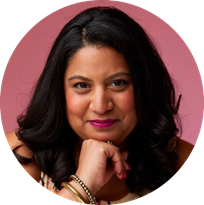 Samhita Mukhopadhyay is the Editorial Director of The Meteor. She is the author of the forthcoming book, The Myth of Making It. She is the former Executive Editor of Teen Vogue and is the co-editor of Nasty Women: Feminism, Resistance and Revolution in Trump's America and the author of Outdated: Why Dating is Ruining Your Love Life.
Samhita Mukhopadhyay is the Editorial Director of The Meteor. She is the author of the forthcoming book, The Myth of Making It. She is the former Executive Editor of Teen Vogue and is the co-editor of Nasty Women: Feminism, Resistance and Revolution in Trump's America and the author of Outdated: Why Dating is Ruining Your Love Life.
Ron DeSantis Bans Climate Change
 May 16, 2024 Evening, Meteor readers, Hoping everyone is having a blessed week except for this man right here. In today’s newsletter, we check in on Florida, salute teenage activists in Ecuador, and share our weekend reading list. Kickin’ it, Shannon Melero  WHAT'S GOING ONFlorida!!!: Ron DeSantis never ceases to amaze me with his insistence on pretending the things he dislikes simply do not exist. First, it was his war on Black history, then it was “Don’t Say Gay”, and now Ronnie is disappearing his latest enemy: climate change. Yesterday, the Florida governor signed new legislation that, according to The Washington Post, “removes most references to climate change in state law” and deprioritizes the issue in policy decisions. DeSantis’s explanation for this new legislation, which goes into effect this summer? “[This will] keep windmills off our beaches, gas in our tanks, and China out of our state…We’re restoring sanity in our approach to energy and rejecting the agenda of the radical green zealots,” he told a local Florida outlet. (It’s worth mentioning here that there are no wind turbines on the beaches, nor is Florida even windy enough to warrant them. The state is better suited to solar power.)  A RECREATION OF ONE OF RON DESANTIS'S NIGHTMARES. (VIA GETTY IMAGES) So why is the failed presidential candidate railing about “green zealots” and imaginary wind turbines, despite the fact that his constituents are some of the most vulnerable in the country to the effects of climate change? The same reason my kid throws her dino nuggets on the floor: to get attention. DeSantis clearly aspires to be more than a governor, and in order to endear himself to the GOP base, he’s got to prove he is willing to defy things like science and logic. According to the Post, “environmentalists said the new law is the latest example of DeSantis’s eagerness to use climate change as a culture war issue such as abortion and transgender rights to bring national attention to himself and hit the right notes with right-wing voters.” But here’s the saving grace: A majority of Floridians agree that climate change is happening, and they want state and federal governments to do something about it. With that in mind, here is a list of offices up for election this year in the state. Vote like your planet depends on it (because it does). AND:
(SCREENSHOT VIA INSTAGRAM)  WEEKEND READING 📚On history repeating itself: Twenty years ago, thousands of people across the globe came together under the slogan of Save Darfur. Now, Darfur is facing a new genocide and the West is responding with “indifference.” (The New York Times) On something bigger: Three journalists dig deeper into the “meaning of Caitlin Clark.” (The Washington Post) On the brain: Student loan debt isn’t just a financial burden; it’s now becoming a mental health burden. (Teen Vogue) On implosions: Something strange is happening at Miss USA and it’s causing queens to quit. (Slate) On Baby Reindeer: Is the Netflix hit a much-needed exploration of trauma, or kinda weird about queerness? Spoilers if you click. (NPR)  FOLLOW THE METEOR Thank you for reading The Meteor! Got this from a friend?
|
![]()
IVF Is Back in the Legal Spotlight
|
Greetings, Meteor readers, I never say this on a Tuesday, but we’ve made it to the best day of the week: Tonight marks the start of the WNBA regular season, and I am thrilled. Tonight’s schedule is jam-packed with games, including the New York Liberty vs. the Washington Mystics and the much-anticipated Indiana Fever vs. Connecticut Sun. Make this the year you get super into women’s basketball, friends.  In today’s newsletter, we look at a confounding IVF case in Texas and ponder Katie Britt’s definition of success. And 1, Shannon Melero  WHAT'S GOING ONIVF back in court? Potentially!: You may recall that back in February, the Alabama high court ruled that embryos produced during IVF were “extrauterine children.” The implication that those embryos had the same rights as actual children briefly shut down the state’s fertility clinics till the legislature (seeing the wild unpopularity of this bonkers situation) intervened to allow IVF to resume. Settled? Not quite. While IVF clinics and doctors are safe from criminal prosecution in Alabama, the fetal personhood court ruling still stands, leaving patients uncertain about what they are liable for if anything happens to their embryos. And now, thanks to a messy divorce, IVF is back in the legal spotlight in another state: Texas. Briefly: A couple in Denton, Texas, Gaby and Caroline Antoun, underwent IVF treatment and signed a contract agreeing that in the case of divorce, Gaby (the husband) would keep any leftover frozen embryos. In 2022, they did get divorced, and the court awarded Gaby the embryos because they were considered property and thus subject to basic contract law. But then Roe was overturned and everything changed. Caroline and her lawyers appealed the original decision, arguing that Texas abortion law now suggests that embryos should be treated as children—making the contract she signed null and void, and meaning that the only way to settle the question is to go to trial for custody. The jokes for this situation write themselves: Who gets the embryos on Saturday? Where will they go for Christmas? But the consequences are real and decidedly unfunny: Caroline wants to take this to the Texas Supreme Court, which is allowing both sides to brief them on the case before deciding whether or not to take on the issue. In an amicus brief presented to the court, the American Society for Reproductive Medicine wrote, “Recognizing ‘personhood’ status for a frozen embryo…would upend IVF in Texas…[and] inject untenable uncertainty into whether and on what terms IVF clinics can continue to operate in Texas.” AND:

 FOLLOW THE METEOR Thank you for reading The Meteor! Got this from a friend?
|
![]()
From Porn Star to Star Witness
|
Darling Meteor readers, Mother’s Day weekend will soon be upon us, and whether you are a mom, have a mom, have lost a mom, or anything along the spectrum—my wish is that you find at least one moment of peace and a reason to smile this weekend. In today’s newsletter, we size up the impact of Stormy Daniels’ eight-hour testimony, bask in women’s basketball, and, as always, share a weekend reading list. With love, Shannon Melero  WHAT'S GOING ONThe eye of the storm: The list of charges Donald Trump hopes will vanish as he attempts to retake the White House runs long. But this week, all eyes have been focused on the 34 felony counts of falsifying business records he faces in New York City, accrued while trying to cover up stories that could have ruined his 2016 run. Allegedly, allegedly. What makes this case unique is first and foremost this: It may very well be the only criminal case against Trump to reach a verdict before the election. But it is also unique because of the testimony of Stormy Daniels, an adult film actress and producer, who says that Trump offered her $130,000 to keep quiet about a sexual encounter they had in 2006. Despite Trump’s lawyer’s best attempts to discredit Daniels (“you made all this up, right?” one asked her), the trial isn’t about whether or not she had sex with the former president. The question is simply whether or not he paid her to keep quiet about it and then disguised that financial record as a “legal expense” paid out to his former fixer, Michael Cohen (who is also set to testify for the prosecution). Doing so would amount to falsifying business records—a crime in the state of New York.
 STORMY DANIELS EXITING A MANHATTAN COURTHOUSE AFTER CONCLUDING HER TESTIMONY. (VIA GETTY IMAGES) If, when all is said and done, a jury finds Trump guilty, he could face prison time. But to be clear, a conviction wouldn’t actually prevent him from continuing to run for president. Technically, convicted felons can run for office—which is odd, since in most states they lose the right to vote. Even being imprisoned might not be enough to keep him from being legally elected; experts are split on that since, as one scholar put it to the Times, “I don’t think that the framers ever thought we were going to be in this situation.” But should this be the one case that brings down Teflon Don—who’s been twice impeached and is somehow still the Republican frontrunner—it will be in no small part thanks to Daniels’ willingness to tell her story, even to her own detriment. There’s something poetic about the fact that our hopes to see a shred of justice hang on how credible 12 jurors find a porn star—the kind of person “upstanding” citizens often ignore during the day but pay great attention to at night with the volume turned down. If Daniels delivers the most desired prison sentence in history, she will be a hero. Which will be quite a change of pace from the derision she’s been met with and could, in a perfect world, create a path for her fellow workers in the porn and sex industries to be treated like human beings in their workplace. AND:
 THE INDIANA FEVER DURING THEIR PRESEASON GAME AGAINST THE WINGS. WHICH WAS SOLD OUT. (VIA GETTY IMAGES)  WEEKEND READING 📚On our Ozempified world: What is the real value of the body positivity movement? The Meteor’s own Samhita Mukhopadhyay investigates, brilliantly. (The Cut) On #MeToo: Harvey Weinstein’s overturned conviction could shape the future of sexual assault trials, and perhaps not for the better. (The Marshall Project) On what makes a murderer: Sarah Stillman’s riveting 2023 story about a charge known as “felony murder” won a Pulitzer Prize this week. (The New Yorker)  FOLLOW THE METEOR Thank you for reading The Meteor! Got this from a friend?
|
![]()
The Dark Menergy of the Kendrick/Drake Feud
|
Dear Meteor readers, We’ve only reached the first Tuesday in May, and it’s already been a busy month. Not only did half the Meteor staff celebrate birthdays, but we also kicked off Asian American Pacific Islander Heritage Month, watched the Met Gala, and began another Trump trial, all while trying to navigate an extremely wild rap beef. On that note, we have a special treat in today’s newsletter: Long-time music journalist and friend of The Meteor, Julianne Escobedo Shepherd, digs into what’s missing from the broader conversation about Drake and Kendrick Lamar's current feud. Plus: a few thoughts on the Met (we had to do it) and a brutal report from the UN about women and girls in Gaza. So many feelings, Samhita Mukhopadhyay  WHAT'S GOING ONThe First Monday in May: Yesterday was the Met Gala, and while it feels like a dreadful time to engage in the time-honored tradition of gawking at celebrities, it was a nice respite from the news. Celebrating the Costume Institute’s new exhibition, “Sleeping Beauties: Reawakening Fashion,” at the Metropolitan Museum of Art, this year’s dress code was “The Garden of Time”—and, as usual, it remains unclear whether or not anyone really understood it. But who cares! Our personal favorites, since you’re asking, include Lily Gladstone’s gorgeous tribute to her indigenous ancestors, Tory Burch re-wearing her wedding dress, Amanda Seyfried’s nod to sustainable fashion, and Zendaya’s expression.  THIS IS HOW I'M ABOUT TO START SHOWING UP TO STAFF MEETINGS. (PHOTO BY GOTHAM/GETTY IMAGES) "Unimaginable risk": In a report released yesterday, the United Nations Office of the High Commissioner on Human Rights detailed just how badly the aggressive military campaign in Gaza is hurting women and girls there. The officials wrote that they were “horrified” by the findings, including 390 bodies of women and children discovered at Al Shifa and Nasser hospitals “with many reportedly showing signs of torture and summary executions, and potential instances of people buried alive.” They also noted that as of last Monday, 34,488 Palestinians have been killed—including 14,500 children and 9,500 women—and that the risks are especially high for pregnant women: “Over 183 women per day are giving birth without pain relief, while hundreds of babies have died because of a lack of electricity to power incubators,” officials wrote. You can read the full report here. AND:
 WOMEN AS PAWNS, AGAINEveryone is Having Fun Talking About Drake and Kendrick LamarA long-time music critic tackles a darker truth at the core of their beef: the expendability of women’s trauma. BY JULIANNE ESCOBEDO SHEPHERD  PHOTO BY JASON KOERNER/GETTY IMAGES Kendrick Lamar and Drake have spent the better part of the past month in a rap beef, which you might already know if you spend time on social media, where they've been trending for days. The origin of their acrimony is vague—the former collaborators turned on each other around 2013—but this recent round was kicked off in late March with a song called "Like That" from Future and Metro Boomin's latest album, We Don't Trust You, on which Kendrick, guest-rapping, essentially called Drake a poseur and a chicken. That provoked some peripheral fallout, including a Drake diss by Rick Ross coming from the sidelines and a very weak response track by J. Cole, which he later walked back, apologizing to a stadium full of his own fans. Confused? There is a lot of minutiae here and even more menergy; all of this feels like a desperate display of testosterone in an era when women rappers are finally flourishing. But there are larger issues here that go beyond which rapper has the better flow, and it might not surprise you that women have ended up as collateral damage.  PHOTO BY PRINCE WILLIAMS/WIREIMAGE Rap beef is rooted in the Dozens, a traditionally African American game of insults. The Dozens, in turn, influenced the freestyle battles that have flourished since hip-hop's inception, in which two rappers diss each other to flex their superior lyrical talents, not unlike a verbal boxing match. In the Drake versus Kendrick battle, Kendrick is obviously superior; he has a better grasp of the language overall—a skill for which he once won a Pulitzer—and is more capable of varying his writing style. There is a comfortable consensus, too, that he's winning the battle due to how deeply his insults cut, to the point that I keep imagining him as the X-Men character Psylocke, wielding a particularly sharpened psychic knife. But as far as rap beefs go, this one feels increasingly gnarly. When Kendrick first asserted on "Like That" that respect is better than money or power, implying that Drake had the latter but not the former, it was fairly standard fare. Drake responded with "Push Ups," which dissed Kendrick's star power, and also with "Taylor Made Freestyle," which claimed that Kendrick's releases were being controlled by Taylor Swift. The idea that a man is in servitude to a woman is a pretty standard insult—but in retrospect, it was also an indicator of where this was all going. Over the course of four more Kendrick songs and two more Drake songs, all released in the short span of seven days, the rappers hit one another with an escalating series of basically criminal accusations. (On Monday evening, a security guard outside Drake's Toronto mansion was shot, though authorities are currently investigating.) Drake accused Kendrick of hiring "a crisis management team to clean up the fact that you beat up your queen." My stomach fell upon hearing it—it's a shocking accusation, especially when it’s brought up so lightly in a rhyme. But even worse was the fact that Kendrick's response was released only 30 minutes later, and so the accusation of violence barely seemed to register. Besides, Kendrick's barbs were just as nasty: that Drake is a pedophile, has a sick interest in underage girls, and that his record label might, in fact, be a ring of pedophiles. Kendrick suggested that Drake should be locked up alongside Harvey Weinstein, who at this moment is awaiting a new trial after a New York court overturned his rape conviction. Obviously, rapping it doesn’t make it true: As a written art form, a lot of rap lyrics are fantasy or narrative construction—that's part of why it's an infringement of First Amendment rights when those lyrics are used as evidence in trials. But does assuming that these allegations are simply lyrical shivs make them any better? Actually, the idea that women and girls are simply pawns in a brawl implies that neither artist cares too much about their well-being—unless they can be used as a weapon. And if these accusations have even a kernel of truth to them, they reflect the way the entertainment industry keeps secrets to protect its own (and the way the #MeToo movement barely touched the music industry.) I keep thinking about Megan Thee Stallion, one of the most talented rappers in the U.S., who spent two full years being excoriated by male musicians and internet trolls after she accused Tory Lanez of shooting her in the foot; she was in a desperate enough place that she later rapped about her thoughts of suicide. Before Lanez was convicted in December 2022, even 50 Cent was forced to apologize for his ill-treatment of Megan. But throughout the case, Drake was one of the worst offenders against Megan, rapping, "This bitch lie 'bout gettin' shots but she still a stallion," one line in a trilogy of Drake albums that seemed to trace his further descent in the darkest crevices of misogyny. (His latest, For All the Dogs, seems at times to just be a list of grievances against women.) As Vulture's Craig Jenkins wrote in a wide-ranging piece about the violence and sex trafficking allegations against superproducer Diddy, "We can’t keep picking and choosing whose abuse we’re willing to buy, turning support for survivors into a contest of whose abusers made the most beloved songs. We can’t let wealthy men treat everyone in the vicinity like chattel."  PHOTO BY MARLEEN MOISE/WIREIMAGE Megan eventually was able to bite back—her January 2024 diss track "Hiss," which in part takes aim at Drake, is the most listenable of all the songs in this rap beef—but the scars are right there on her album, called Traumazine. The unnamed women in Drake and Kendrick Lamar's beef tracks surely have their own scars, too. While hip-hop battles can sometimes feel like a sport, this one has become increasingly nihilistic. One wonders if either of these men is invested in what they’re saying or can even fathom what’s at stake for the lives of the people they are talking about, real or fictional.  FOLLOW THE METEOR Thank you for reading The Meteor! Got this from a friend?
|
![]()
Everyone is Having Fun Talking About Drake and Kendrick Lamar
May 7, 2024NEWS,FEATURED STORY
A long-time music critic tackles a darker truth at the core of their beef: the expendability of women’s trauma
By Julianne Escobedo Shepherd
Kendrick Lamar and Drake have spent the better part of the past month in a rap beef, which you might already know if you spend time on social media, where they've been trending for days. The origin of their acrimony is vague—the former collaborators turned on each other around 2013—but this recent round was kicked off in late March with a song called "Like That" from Future and Metro Boomin's latest album, We Don't Trust You, on which Kendrick, guest-rapping, essentially called Drake a poseur and a chicken. That provoked some peripheral fallout, including a Drake diss by Rick Ross coming from the sidelines and a very weak response track by J. Cole, which he later walked back, apologizing to a stadium full of his own fans.
Confused? There is a lot of minutiae here and even more menergy; all of this feels like a desperate display of testosterone in an era when women rappers are finally flourishing. But there are larger issues here that go beyond which rapper has the better flow, and it might not surprise you that women have ended up as collateral damage.
Rap beef is rooted in the Dozens, a traditionally African American game of insults. The Dozens, in turn, influenced the freestyle battles that have flourished since hip-hop's inception, in which two rappers diss each other to flex their superior lyrical talents, not unlike a verbal boxing match. In the Drake versus Kendrick battle, Kendrick is obviously superior; he has a better grasp of the language overall—a skill for which he once won a Pulitzer—and is more capable of varying his writing style. There is a comfortable consensus, too, that he's winning the battle due to how deeply his insults cut, to the point that I keep imagining him as the X-Men character Psylocke, wielding a particularly sharpened psychic knife.
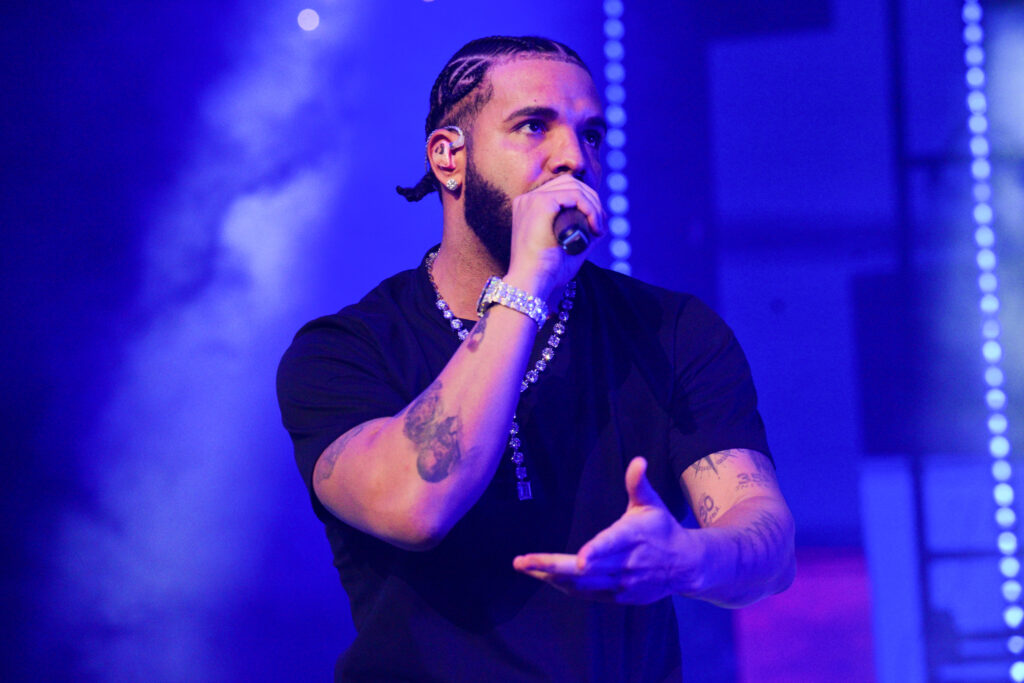
But as far as rap beefs go, this one feels increasingly gnarly. When Kendrick first asserted on "Like That" that respect is better than money or power, implying that Drake had the latter but not the former, it was fairly standard fare. Drake responded with "Push Ups," which dissed Kendrick's star power, and also with "Taylor Made Freestyle," which claimed that Kendrick's releases were being controlled by Taylor Swift. The idea that a man is in servitude to a woman is a pretty standard insult—but in retrospect, it was also an indicator of where this was all going.
Over the course of four more Kendrick songs and two more Drake songs, all released in the short span of seven days, the rappers hit one another with an escalating series of basically criminal accusations. (On Monday evening, a security guard outside Drake's Toronto mansion was shot, though authorities are currently investigating.) Drake accused Kendrick of hiring "a crisis management team to clean up the fact that you beat up your queen." My stomach fell upon hearing it—it's a shocking accusation, especially when it’s brought up so lightly in a rhyme.
But even worse was the fact that Kendrick's response was released only 30 minutes later, and so the accusation of violence barely seemed to register. Besides, Kendrick's barbs were just as nasty: that Drake is a pedophile, has a sick interest in underage girls, and that his record label might, in fact, be a ring of pedophiles. Kendrick suggested that Drake should be locked up alongside Harvey Weinstein, who at this moment is awaiting a new trial after a New York court overturned his rape conviction. Obviously, rapping it doesn’t make it true: As a written art form, a lot of rap lyrics are fantasy or narrative construction—that's part of why it's an infringement of First Amendment rights when those lyrics are used as evidence in trials. But does assuming that these allegations are simply lyrical shivs make them any better? Actually, the idea that women and girls are simply pawns in a brawl implies that neither artist cares too much about their well-being—unless they can be used as a weapon.

And if these accusations have even a kernel of truth to them, they reflect the way the entertainment industry keeps secrets to protect its own (and the way the #MeToo movement barely touched the music industry.) I keep thinking about Megan Thee Stallion, one of the most talented rappers in the U.S., who spent two full years being excoriated by male musicians and internet trolls after she accused Tory Lanez of shooting her in the foot; she was in a desperate enough place that she later rapped about her thoughts of suicide. Before Lanez was convicted in December 2022, even 50 Cent was forced to apologize for his ill-treatment of Megan.
But throughout the case, Drake was one of the worst offenders against Megan, rapping, "This bitch lie 'bout gettin' shots but she still a stallion," one line in a trilogy of Drake albums that seemed to trace his further descent in the darkest crevices of misogyny. (His latest, For All the Dogs, seems at times to just be a list of grievances against women.) As Vulture's Craig Jenkins wrote in a wide-ranging piece about the violence and sex trafficking allegations against superproducer Diddy, "We can’t keep picking and choosing whose abuse we’re willing to buy, turning support for survivors into a contest of whose abusers made the most beloved songs. We can’t let wealthy men treat everyone in the vicinity like chattel."
Megan eventually was able to bite back—her January 2024 diss track "Hiss," which in part takes aim at Drake, is the most listenable of all the songs in this rap beef—but the scars are right there on her album, called Traumazine. The unnamed women in Drake and Kendrick Lamar's beef tracks surely have their own scars, too. While hip-hop battles can sometimes feel like a sport, this one has become increasingly nihilistic. One wonders if either of these men is invested in what they’re saying or can even fathom what’s at stake for the lives of the people they are talking about, real or fictional.
“I Did Not Think This Change Would Come in My Lifetime”
A seminary dropout on the latest decision from the United Methodist Church
By Bailey Wayne Hundl
For the last 25 years, pastors in the United Methodist Church (UMC) have faced losing their jobs and having their ordination revoked for officiating same-sex weddings—even when doing so for their own children. The UMC bylaws have also prohibited “self-avowed practicing homosexuals” from being ordained as ministers—or appointed to serve in any capacity—since 1984.
All of that changed on Wednesday. With an overwhelming majority and no debate, the denomination’s highest legislative body voted to overturn these policies.
For me, this is personal. For the better part of a decade, I was one of those pesky “self-avowed practicing homosexuals” causing trouble in the UMC. (That link has my deadname, but I’ll be cool about it if you will.) While I was in seminary, I even sought ordination through the UMC—though admittedly, I didn’t make it very far. And when I think about all the shit I’ve seen, I have to be honest: I did not think this change would come in my lifetime.
When I was 19 years old, I interviewed for an internship with a youth pastor at a UMC church. It went phenomenally (mainly on account of me being awesome and a Capricorn rising). The youth pastor even told me, “I have other people to interview, but if I’m being honest, you’re perfect for this and this is perfect for you.” I said that that was great, but that before we finished, there was one last thing he should know about me; I told him I was gay. And he asked me to leave.
I went home fuming but undeterred, a feeling that, over the years, became all too familiar. When I was 20, I attended a UMC legislative session reviewing the church’s restrictive bylaws against gay people. Before the vote, anyone could come to the mic and speak for or against the issue—and the lines for both were long. I remember the burning of my ears and the tight grip of my friend’s hand in mine as one woman droned on about the dangers of the “demon” of homosexuality and how we must do anything in our power to stop it. In that same room two years later, at a conference for queer Christians, I watched my friend break down in tears as he described being exorcized by his foster parents, who later disowned him.
I carry too much pain from these experiences to expel in one short article. Do I mention my first pastoral internship, the one I accepted before I came out, where I waited for my host family to fall asleep so I could whisper over the phone to my boyfriend that I loved him? The otherwise progressive church who kicked a gender-nonconforming member out of their choir for being “too distracting”? Or hell, what about the responses I received just yesterday when I tweeted in celebration?
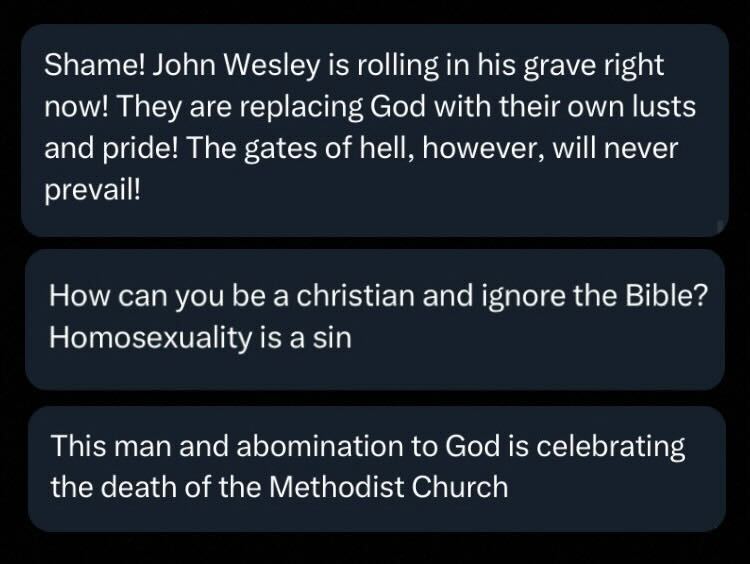
For years, I grew more and more battle-hardened, staying in the fight (and the church) for three reasons: my love for the faith, my love for queer people, and the notion that somebody had to clean up this mess. Eventually, I made the choice so many have: I left for my own sanity.
I know that for many people, this seems like the obvious choice. “If the church is homophobic, why don’t you just leave?” But when we buy into the false dichotomy of Religious vs. Queer (a dichotomy invented by homophobes, mind you), we force queer people to sever themselves from a crucial aspect of themselves, something that gives their life meaning, community, and hope. And I’ve watched too many people—people I love, people I miss—pick the former.
But now, thanks to this monumental decision brought about by the stubborn hopefulness of queer Methodists and their allies, fewer of my family will be forced to leave themselves behind. It’s a good day.
The Methodists Overturn Long-Standing Homophobic Rules
|
Salutations, Meteor readers, What a great newsletter we have for you tonight. My colleague Bailey Wayne Hundl explains the implications of the United Methodist Church’s recent decision to allow LGBTQ+ people to be ordained, a journey with which Bailey is personally familiar. She’s lived many lives! We’re also discussing new proposed legislation—backed by Halle Berry—for people experiencing menopause and, as always, offering some weekend reading. With love, Shannon Melero  WHAT'S GOING ONHalle yes: Today, a bipartisan group of women senators proposed a new bill that would devote $275 million to menopause research and care. And the woman largely behind it? Halle Berry, whose own experience with menopause was met with an enraging and uninformed misdiagnosis of herpes. “I have this great sex. I wake up in the morning, I go to the bathroom, and guess what? I feel like I have razor blades in my vagina,” Berry says of the moment that sent her to the doctor’s office and ultimately resulted in discovering she was perimenopausal. Inspired by her experience to “do something about it,” Berry is now the poster woman for the Menopause Care and Mid-Life Women's Health Act. During a press conference announcing the proposal, one of the senators co-sponsoring the bill noted, “Menopause is not a bad word. It's not something to be ashamed of. And it is not something Congress or the federal government should ignore. There is no excuse for shortchanging this issue when it comes to federal dollars.” AND:
 AN OFFICER WITH THE CALIFORNIA HIGHWAY PATROL DETAINS A PROTESTOR AS THE UCLA ENCAMPMENT IS CLEARED OUT. (VIA GETTY IMAGES)
 LOVE THY NEIGHBOR“I Did Not Think This Change Would Come in My Lifetime”A seminary dropout on the latest decision from the United Methodist Church BY BAILEY WAYNE HUNDL  THE CULMINATION OF YEARS OF WORK. (VIA AP IMAGES) For the last 25 years, pastors in the United Methodist Church (UMC) have faced losing their jobs and having their ordination revoked for officiating same-sex weddings—even when doing so for their own children. The UMC bylaws have also prohibited “self-avowed practicing homosexuals” from being ordained as ministers—or appointed to serve in any capacity—since 1984. All of that changed on Wednesday. With an overwhelming majority and no debate, the denomination’s highest legislative body voted to overturn these policies. For me, this is personal. For the better part of a decade, I was one of those pesky “self-avowed practicing homosexuals” causing trouble in the UMC. (That link has my deadname, but I’ll be cool about it if you will.) While I was in seminary, I even sought ordination through the UMC—though admittedly, I didn’t make it very far. And when I think about all the shit I’ve seen, I have to be honest: I did not think this change would come in my lifetime. When I was 19 years old, I interviewed for an internship with a youth pastor at a UMC church. It went phenomenally (mainly on account of me being awesome and a Capricorn rising). The youth pastor even told me, “I have other people to interview, but if I’m being honest, you’re perfect for this and this is perfect for you.” I said that that was great, but that before we finished, there was one last thing he should know about me; I told him I was gay. And he asked me to leave. I went home fuming but undeterred, a feeling that, over the years, became all too familiar. When I was 20, I attended a UMC legislative session reviewing the church’s restrictive bylaws against gay people. Before the vote, anyone could come to the mic and speak for or against the issue—and the lines for both were long. I remember the burning of my ears and the tight grip of my friend’s hand in mine as one woman droned on about the dangers of the “demon” of homosexuality and how we must do anything in our power to stop it. In that same room two years later, at a conference for queer Christians, I watched my friend break down in tears as he described being exorcized by his foster parents, who later disowned him. I carry too much pain from these experiences to expel in one short article. Do I mention my first pastoral internship, the one I accepted before I came out, where I waited for my host family to fall asleep so I could whisper over the phone to my boyfriend that I loved him? The otherwise progressive church who kicked a gender-nonconforming member out of their choir for being “too distracting”? Or hell, what about the responses I received just yesterday when I tweeted in celebration?  WWJD? NOT THIS. (SCREENSHOT COURTESY OF BAILEY WAYNE HUNDL) For years, I grew more and more battle-hardened, staying in the fight (and the church) for three reasons: my love for the faith, my love for queer people, and the notion that somebody had to clean up this mess. Eventually, I made the choice so many have: I left for my own sanity. I know that for many people, this seems like the obvious choice. “If the church is homophobic, why don’t you just leave?” But when we buy into the false dichotomy of Religious vs. Queer (a dichotomy invented by homophobes, mind you), we force queer people to sever themselves from a crucial aspect of themselves, something that gives their life meaning, community, and hope. And I’ve watched too many people—people I love, people I miss—pick the former. But now, thanks to this monumental decision brought about by the stubborn hopefulness of queer Methodists and their allies, fewer of my family will be forced to leave themselves behind. It’s a good day.  WEEKEND READING 📚On parenting: The one place in the world where it’s the hardest to care for your children? Gaza. (The Washington Post) On incarceration: “Less than two years ago, [Brittney] Griner was starting her nine-year sentence in a penal colony in Russia, sewing uniforms for the Russian military and subsisting on spoiled food.” Now, Griner is ready to share her story. (The New York Times Magazine) On the history of student protests: One day in 1970, everything changed for on-campus protests in America. (Teen Vogue) On women’s health: Yes, women live longer. But they also are more likely to be ill in those years. (The Guardian)  A quick PS from Shannon: Wishing a happy early birthday to my father, a true Taurus, gone too soon. Miss you every day old man. FOLLOW THE METEOR Thank you for reading The Meteor! Got this from a friend?
|
![]()
Remembering Hind Rajab
 April 30, 2024 Hola, Meteor readers, I have to apologize to everyone reading this because I failed to acknowledge the start of a very important season in the celestial calendar. Happy Taurus season, baabyyyyyyy!!! Enjoy the grounding and reliable energy of this season while it lasts. In today’s newsletter, we revisit the story of Hind Rajab, a tragedy you may have missed. Plus, a spot of joy for trans people in North Carolina and West Virginia. Shannon ♉Melero  WHAT'S GOING ONWho is Hind?: On Monday night, protestors at Columbia University overtook Hamilton Hall, a building on campus, and unfurled a banner renaming it Hind’s Hall. The action came hours after the university made good on a threat to begin suspending students if they did not leave the growing encampment. In an Instagram statement, the students occupying Hind’s Hall say they plan to remain there until Columbia completely divests from Israel. (Columbia’s president said that the university would not do so, but “would develop an expedited timeline for review of new proposals from the students by the Advisory Committee for Socially Responsible Investing, the body that considers divestment matters.”) While pundits debate the validity of the takeover—which has happened in this building before—we are answering a different question: Who is Hind?  HIND RAJAB, A BEAUTIFUL LIGHT SNUFFED OUT BY VIOLENCE (VIA INSTAGRAM) In January, a six-year-old girl named Hind Rajab, members of her family, and two paramedics were killed by what would later be confirmed as Israeli gunfire just outside of Gaza City. The family had been attempting to exit an evacuation zone and return to their home in northern Gaza City when their vehicle was surrounded by the Israeli army, which then opened fire. The initial gunshots killed five of the seven people in the car—leaving Hind and her cousin, 15-year-old Layan, the only two alive. Layan called for help; in an audio clip published by The Washington Post, she can be heard explaining the situation and breaking off into screams as gunfire drowns out her voice. The call drops. Emergency services called the number back, and Hind answered. Layan had been killed. Badly injured and the last person alive in the car, Hind described to the dispatcher the Israeli tank that was closing in on her. Dispatchers stayed on the phone with Hind for over an hour, at one point patching in her mother—who had not traveled with the family—as they tried desperately to keep her conscious. She just needed to wait for an ambulance that was getting permission from the Israeli military to travel to her position. But that ambulance would never arrive. Despite having permission to travel on a specific road, displaying lights, and sounding its siren, the ambulance also came under Israeli fire; the paramedics inside were killed. It would be nearly two weeks before Hind’s uncle could recover the bodies of his loved ones from the bullet-riddled vehicle. The Post describes the moment: “We were only able to deduce their identities,” he recalled. The student protests at colleges and universities around the country have sparked a furious discussion in part because, as Lydia Polgreen writes in The New York Times, “the way you understand these protests depends on your perception of what they are protesting.” But the banner hanging from Hind’s Hall should remind us of where our attention needs to be focused: on the lives we’ve lost and the horrific ways we’ve lost them. AND:
  FOLLOW THE METEOR Thank you for reading The Meteor! Got this from a friend? Subscribe using their share code or sign up for your own copy, sent Tuesdays, Thursdays, and some Saturdays.
|
![]()
